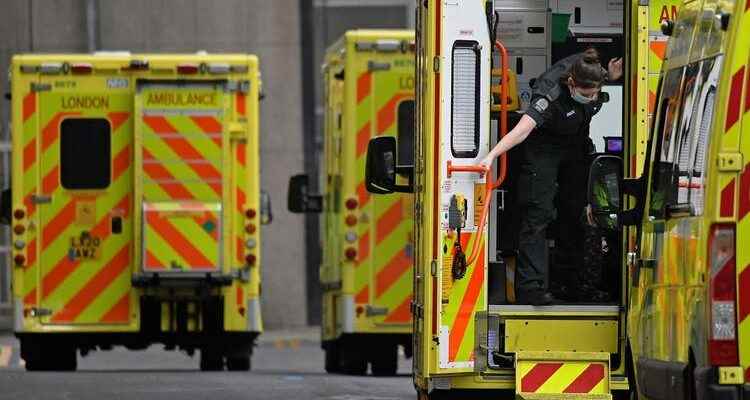Waiting times at the National Health Service (NHS) reached an all-time high in October. Now the British nursing staff wants to fight for higher wages with strikes – which threatens to exacerbate the dramatic bottlenecks.
The British often have to wait a long time for ambulances in emergencies.
An elderly woman from Devon has to stay on the ground for a day after falling because the ambulance didn’t arrive after the emergency call. A 27-year-old patient from Lincoln with respiratory problems arrives at the crowded emergency room after waiting so long for a consultation that he leaves the hospital in frustration and falls dead outside the hospital entrance.
Such horror stories are heard more and more often in Great Britain – and they are now also reflected in the official statistics: In October, 20,000 patients a day waited four hours or more in the emergency room for treatment – representing about 30 percent of all emergency patients. Waiting times at the National Health Service (NHS) are at an all-time high.
Overburdened general practitioners, hospitals and nursing homes
The situation is not dramatic in all British hospitals. But across England and Wales, 44,000 patients waited more than 12 hours in corridors for a hospital bed last month. In October a year ago, a good 7,000 patients had to endure such excessive waiting times. Anyone who suffers a heart attack or stroke currently has to wait an average of more than an hour for the ambulance to arrive. It is not surprising that Adrian Boyle, President of the Royal College of Emergency Medicine, warns of a substantial increase in the number of deaths.
Since there are also long waiting times for general practitioners, many Britons prefer to go to the emergency room even for minor ailments. This, combined with a wave of flu and Covid, resulted in a huge crowd in October. In addition, social welfare and nursing homes are completely overburdened: patients in need of care occupy the hospital beds for an unnecessarily long time because they cannot be discharged into a suitable institution.
Debt or wait nine months
The waiting times are also getting longer and longer for planned interventions. For example, 31-year-old Dean recently injured his knee playing football and is now unable to move his leg. According to the Londoner, who prefers not to read his last name in the newspaper, the diagnosis revealed surgery was inevitable. However, the NHS waiting time for the procedure is nine months.
Privately insured people get much quicker access to surgeries. However, Dean has no private insurance, so he would have to pay for the procedure in a private clinic out of his own pocket. Now the estate agent has a choice of going into debt for the £7,000 procedure or walking on crutches and waiting until the spring for the operation.
The waiting times for cancer patients who need chemotherapy or radiation can be life-threatening. According to official NHS figures, more than 5,000 patients waited more than two months in September to start treatments.
Pandemic and staff shortages
The backlog caused by the pandemic is an important reason for the bottlenecks: In February 2020, less than 2,000 patients in England and Wales were waiting longer than a year for hospital treatment. Today there are over 400,000. The new Prime Minister Rishi Sunak is aware of the need for action. Chancellor of the Exchequer Jeremy Hunt will present a new budget with tax increases and spending cuts on Thursday and is likely to exclude taxpayer-funded health care from the austerity program.
It is questionable whether the government will succeed in reducing the waiting times until the next parliamentary elections in early 2025 at the latest with efficiency gains and a temporary increase in capacity by 30 percent. According to experts, the government urgently needs to address the staff shortage. There are currently 132,000 vacancies in the NHS.
Nursing staff want to go on strike
The starting salary for nursing staff is around £27,000 per year. Experienced and specialized carers come to a maximum of around 50,000 pounds. The unions emphasize that nursing staff have suffered a 20 percent drop in real wages over the past ten years. Now they are demanding wage increases of 17 percent – more than consumer goods inflation, which is currently 12 percent.
The government replies, meeting this demand would cost a total of £9 billion, which the country simply cannot afford given its financial plight. Nor can the government afford a long confrontation with the unions, which would further exacerbate waiting times and bottlenecks. NHS leaders are already concerned that residents and ambulance staff will also stop working. The horror stories from the British healthcare system threaten to accumulate further in the winter.
